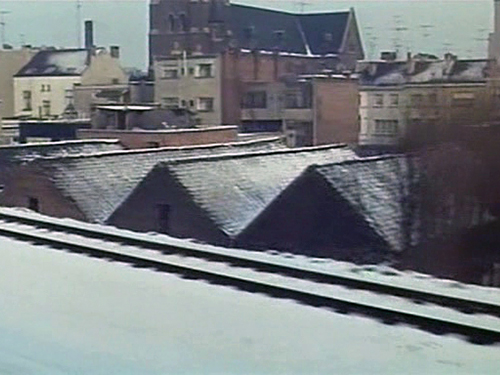
Mathias (Yves Montand) is a selfish professional who lives in Leuven with his wife Anne, who is more sensitive by nature. He rarely questions their relationship, which is clearly cracked. One evening, during a train journey, Anne mysteriously disappears. Mathias goes looking for her and ends up in a strange region where an unintelligible language is spoken and he has to come to terms with himself.
EN
Paul Delvaux’ paintings are often set in desolate train stations where mysterious women linger. They seem to be waiting, but whether it’s for an encounter or a farewell remains unknown. In this intermediate moment, it seems as if time itself has been derailed. The Belgian director André Delvaux (no, not family) made a film that seems inspired by those paintings. In the film, the train is a metaphor of life. People pass their time collectively as passengers, forcibly moving through time together. Trains create the conditions for a cinematic spectatorship: like the film spectator you’re sitting passively, moved by the spectacle behind the window. And just like the characters in Un soir, un train are unable to gain control over their lives, the cinema-traveller is unable to climb through the window and take part in that other reality.
Nina de Vroome
NL
“Want de literator is niets menselijks vreemd en de film, als de meest realistische, de meest verwarrende magisch-realistische kunst, heeft een werkelijkheid van de tweede graad geschapen waarover de literator zal schrijven als uit een reeds een eerste maal gepuurde levenssubstantie: ze is leven en kunst en daardoor natuur- en cultuurstof voor de schrijver.”
Johan Daisne1
FR
« Mathias aime la terre ferme et tout ce qui est solide, net, précis. C’est là justement que la mort l’attend. La terre ferme n’est qu’un marécage sans issue. De l’autre côté, un langage qui n’a plus cours. Et dans l’évidence du face à face avec la mort, soudain, Anne perdue pour toujours ». Jean Collet a bien montré comment l’assurance de Mathias le rend téméraire et finalement victime de ces machinations impalpables qu’un Cocteau en revanche avait si fortement mises en relief :
Accidents du mystère et fautes de calcul
Célestes, j’ai profité d’eux, je l’avoue.
Toute ma poésie est là : je décalque
L’invisible (invisible à vous).
J’ai dit : Inutile de crier « haut les mains »
Au crime déguisé en costume inhumain ;
J’ai donné le contour à des charmes informes
Des ruses de la mort la trahison m’informe…
Ce dernier vers semble avoir été écrit pour annoncer Un soir, un train. Meme s’il n’y a pas ici trahison mais simples échappées sur l’invisible, rumeur de ce qui se trame, Mathias aurait dû le percevoir. Il faudra ce rêve pour qu’il le perçoive avec son inconscient, plus sensible et plus pénétrant que son intelligence. »
Henri Agel, Joseph Marty1
- 1Henri Agel, Joseph Marty, André Delvaux, De l’inquiétante étrangeté à l’itinéraire initiatique, Editions L'Age d’Homme, 1996.

